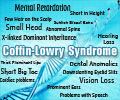Researchers have successfully reversed the symptoms of mental retardation and autism in mice for the first time.
Researchers have successfully reversed the symptoms of mental retardation and autism in mice for the first time.
The study was conducted by a team of researchers including Mansuo L. Hayashi and Susumu Tonegawa at the Picower Institute for Learning and Memory at MIT.As part of the study, researchers genetically manipulated mice to model Fragile X Syndrome (FXS), the leading inherited cause of mental retardation and the most common genetic cause of autism.
The condition, tied to a mutated X chromosome gene called fragile X mental retardation 1 (FMR1) gene, causes mild learning disabilities to severe autism.
Researchers identified a key enzyme, a chemical reaction-inducing protein as a possible target for an FXS drug. The enzyme, called p21-activated kinase, or PAK, affects the number, size and shape of connections between neurons in the brain.
Researchers found that halting PAK's enzymatic activity reversed the structural abnormality of neuronal connections found in the FXS mice.
In the brain, small protrusions called dendritic spines on the branch-like dendrites of one neuron receive chemical signals from other neurons and communicate them to the main cell body. The numbers and shapes of dendritic spines are key to normal brain function.
Advertisement
When the enzymatic activity of PAK was inhibited in the FXS mice, abnormalities in their spine number and structure-as well as the weaker electrical communication between their neurons-were reversed.
Advertisement
"These behavioural abnormalities are ameliorated, partially or fully, by inhibiting the enzymatic activity of PAK,” Tonegawa said.
"Strikingly, PAK inhibition also restored electrical communication between neurons in the brains of the FXS mice, correcting their behavioural abnormalities in the process," he added.
"Our study suggests that inhibiting a certain enzyme in the brain could be an effective therapy for countering the debilitating symptoms of FXS in children, and possibly in autistic kids as well," Hayashi said.
The findings of the study will be published in the online early edition of the Proceedings of the National Academy of Sciences
Source-ANI
LIN/M









